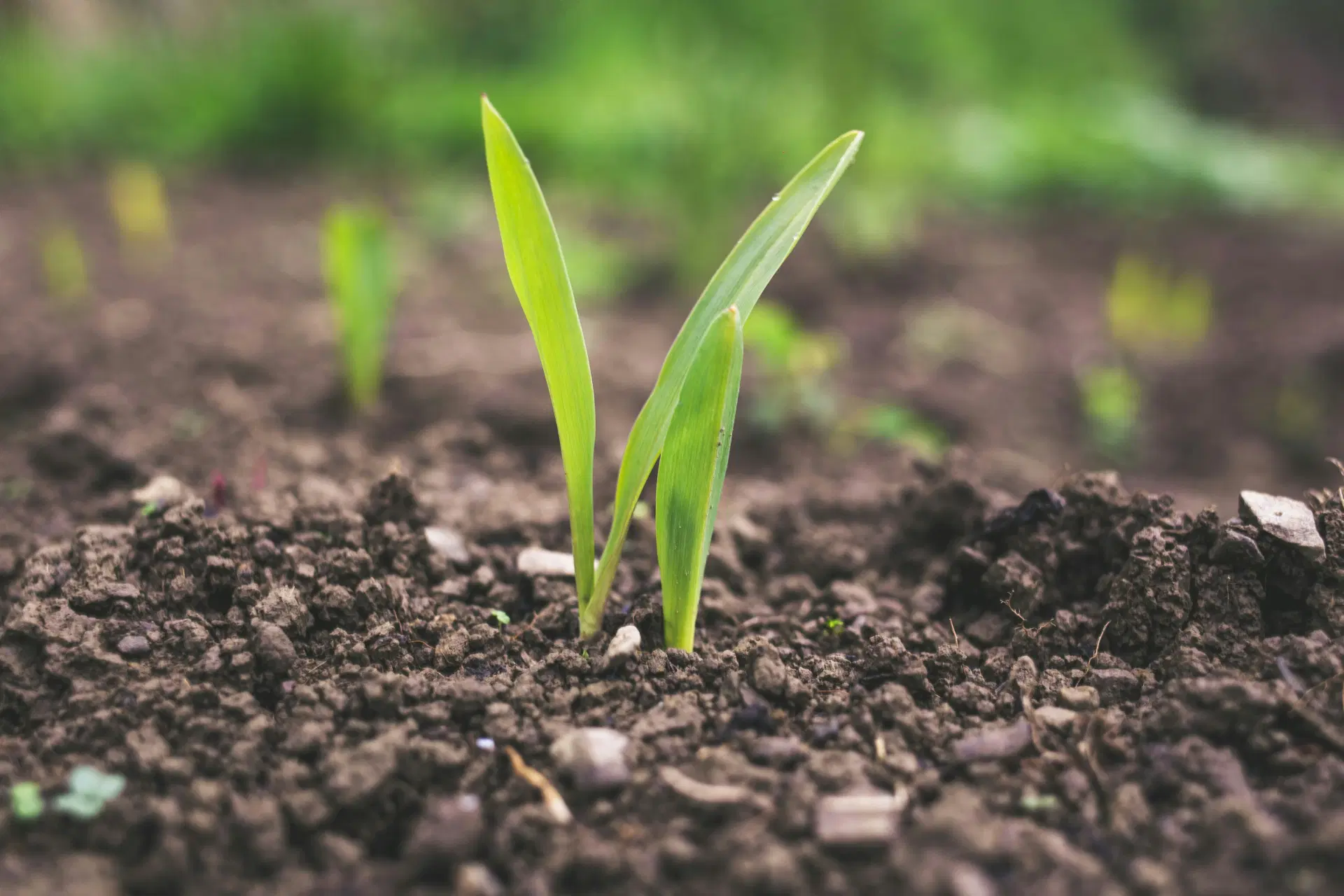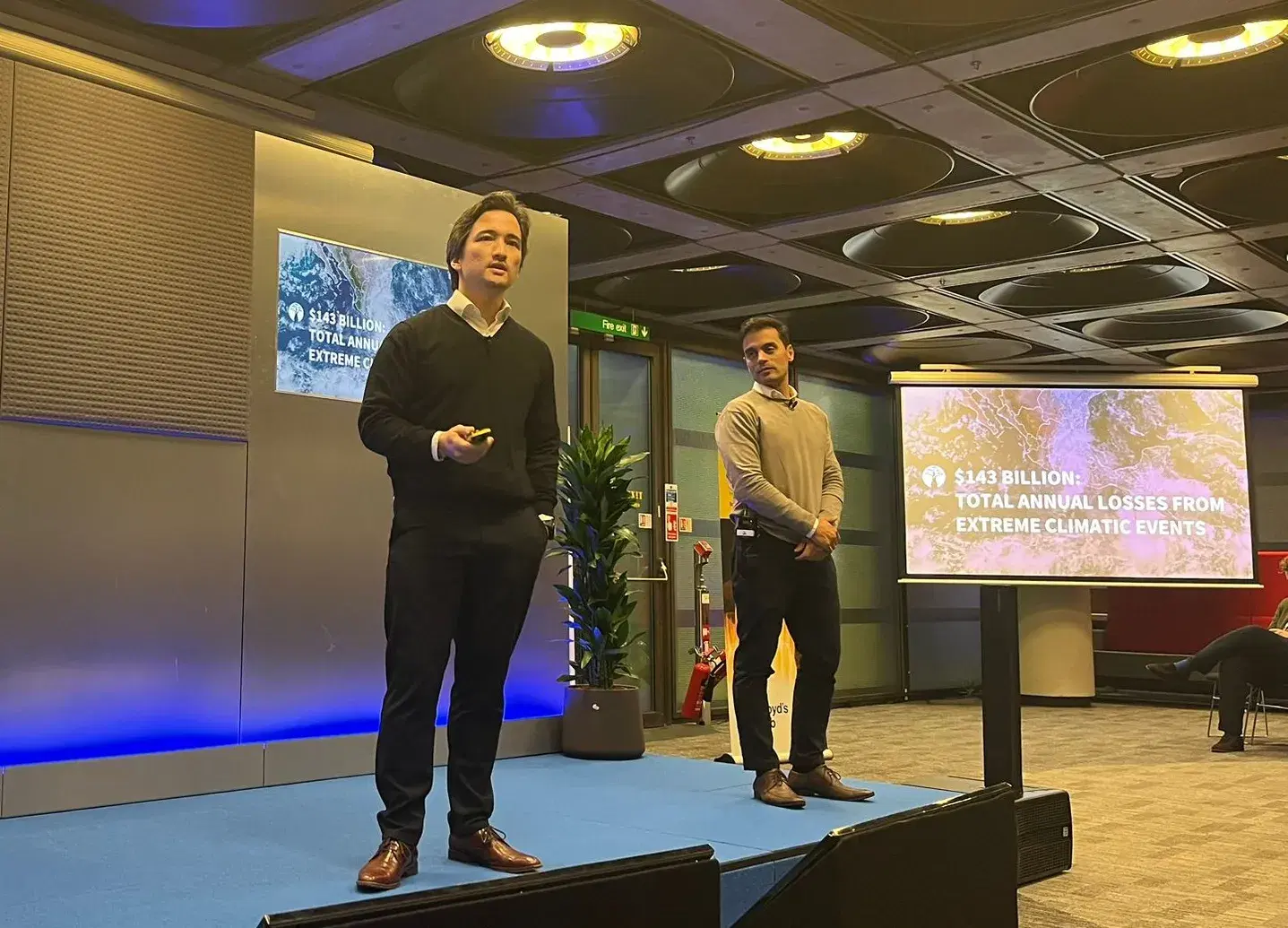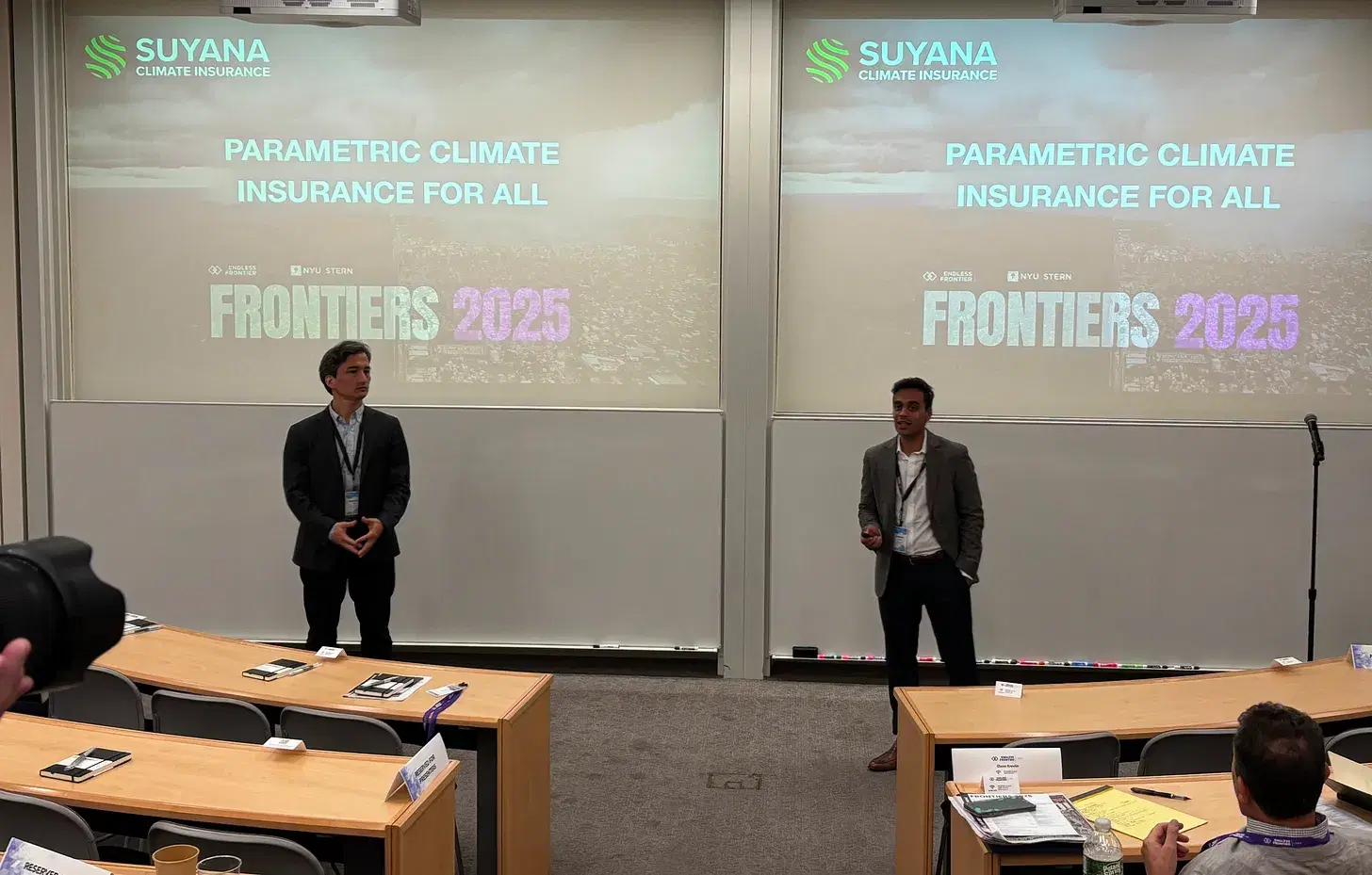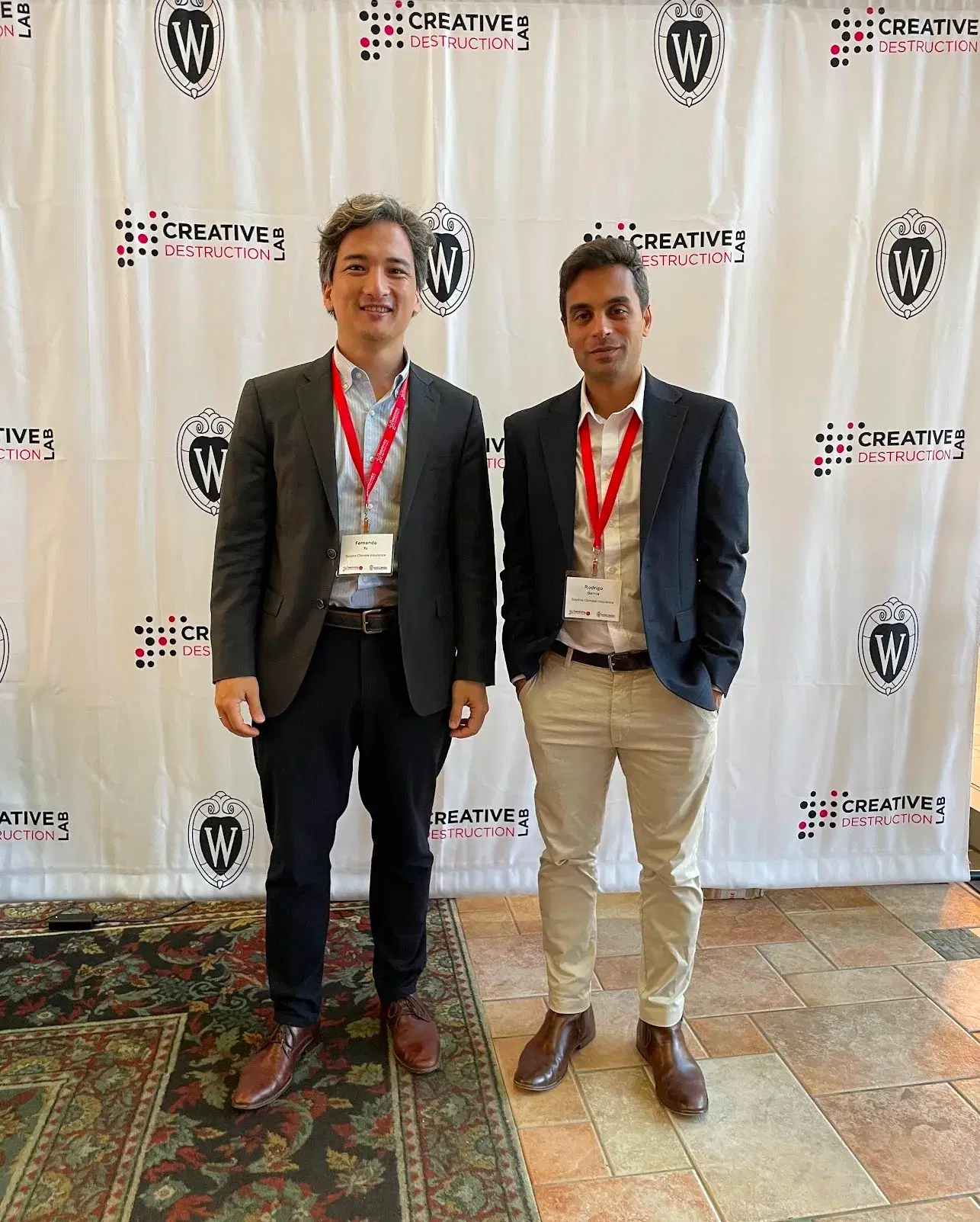On Mentorship
A reflection on Suyana's journey through the entrepreneurship ecosystem

If I have seen further it is by standing on the shoulders of Giants.
- Isaac Newton
When we first pitched Suyana's satellite-based insurance to a room of reinsurers at Lloyd's Lab, we realized we weren't just selling a product, we were translating between two worlds. On one side, a centuries-old industry built on actuarial tables and historical precedent. On the other, a revolution in satellite technology and machine learning that rewrites the rules daily.
We're bridging these worlds to solve one of climate change's most pressing challenges: how to protect vulnerable communities from extreme weather events. Today, as we prepare to launch our first drought and storm surge covers in Latin America, I want to share a perspective that's often overlooked in the startup narrative: the critical role of accelerators and mentorship in turning audacious ideas into reality.

Suyana Climate Insurance at the Lloyd’s Lab Demo Day.
1 / The Reality Behind the Headlines
The entrepreneurship narrative often focuses on the glamorous moments: the funding announcements, the unicorn valuations, the IPO bells. But what about the quieter, grittier journey from the spark of an idea to a minimum viable product?
This germination process is inherently collaborative. While entrepreneurship demands courage, commitment, and a healthy mix of delusion and self-determination, no founder succeeds alone. There's always a vast network of people and organizations supporting the work behind the scenes.
Over the past two years, we've been fortunate to participate in prestigious programs including Lloyd's Lab, Creative Destruction Lab, Endless Frontier Labs, and Harvard Alumni Entrepreneurs. Each provided invaluable mentorship and support. But as economists by training, we couldn't help but ask the fundamental question every entrepreneur should consider: do these programs actually work? And if so, how?
2 / Do accelerators make a difference and if so, how?
The answer to the first question is a resounding yes, and the data backs it up.
The research on this topic tells a compelling story. A comprehensive World Bank study found that accelerator programs increase startup profits by 10 percentage points and sales by 5 percentage points (Mackenzie, 2021). While these might seem modest, the real magic happens in the financing arena.
Programs focused on investment readiness show a 12-14 percentage point increase in the likelihood of securing external financing, specifically for firms that would otherwise struggle to access capital (Cusolito, et al, 2021). For climate tech startups like ours, operating in a fast-paced and innovative industry where investors may hesitate to enter unfamiliar territory, this difference can be make-or-break.
Start-up Chile offers a powerful case study. The program takes 100 firms a year at a cost of $15 million, but it has already produced an ecosystem with several multimillion-dollar companies in their portfolio (Gonzalez-Uribe and Leatherbee, 2018). The math works because accelerators like Start-up Chile play the house, they bet on many ventures knowing that even a few successes can generate outsized returns.
Y Combinator provides an even more striking example of this portfolio approach. Since 2005, YC has funded over 4,000 companies through its biannual cohorts, with a combined valuation exceeding $600 billion. Notable graduates include Airbnb, Dropbox, Stripe, and DoorDash—each now worth tens of billions. While the vast majority of YC companies don't reach unicorn status, the handful that do generate returns that dwarf the program's entire investment. This exemplifies the venture capital math at scale: accept that most bets won't pay off, but ensure the winners more than compensate for all the losses.
"When you're insuring Bolivian farmers for the first time against drought using satellite data, traditional metrics don't always apply."

Suyana Climate Insurance at NYU Stern’s Endless Frontier Labs
3 / Beyond Capital: Learning the Unwritten Rules
What makes accelerators and mentorship programs particularly valuable isn't just the funding connections, it's the transmission of tacit knowledge. Becoming "investment ready" means learning to navigate an entirely new ecosystem with its own language, expectations, and unwritten rules. Some companies are natural learners, the rest need more guidance, particularly if the space is new.
This challenge is especially acute in climate tech. We're not just building products, we are creating new markets around complex problems like climate risk. For instance, we learned that when pitching climate risk to financial institutions, leading with technology features was less effective than starting with their existing exposure gaps. Similarly, when hiring climate scientists, emphasizing our mission to protect vulnerable communities resonated far more than our cutting-edge tech stack. When you're insuring Bolivian farmers for the first time against drought using satellite data, traditional metrics don't always apply. This is precisely where experienced mentors who've navigated similar uncharted territory become invaluable.
Investment Readiness Programs fill a crucial gap between intensive (and expensive) accelerator approaches and basic classroom training. They provide comprehensive support through individualized training, mentoring, and coaching, at an intensity sufficient to make firms investment-ready while maintaining a cost that is low enough to be scalable to large numbers of firms. Several studies have documented that Investment Readiness Programs can be effective at helping smaller and less experienced firms close the financing gap. A study by the World Bank found that access to mentorship increased the investment readiness of companies (Cusolito, et al, 2021). From a private sector development standpoint, this lesson is critical because it provides guidelines on what interventions to prioritize.
The key insight is that investment readiness is a broad concept, and much of the essential knowledge is tacit. Becoming investment-ready requires learning the rules of an entirely new game. Mentorship programs excel at this knowledge transfer, providing opportunities for skill development where experienced mentors share expertise and guidance as entrepreneurs develop new capabilities.
4 / Suyana's Journey
These insights aren't just academic, they've been our lived experience at Suyana. We are tackling urgent global problems with emerging technologies in underserved markets. The complexity of climate science, the urgency of climate impacts, and the need for innovative financing models create unique challenges that benefit enormously from experienced guidance.
What we have experienced at Suyana goes beyond individual mentorship. Through Lloyd's Lab, we have connected with reinsurers who understand our risk models. Through Creative Destruction Lab, we have met with carriers to understand their climate exposure challenges. Through Endless Frontiers Labs, we have connected with investors and mentors that helped with our fundraising. Through Harvard Alumni Entrepreneurs, we have found advisors with experience building companies from scratch. These aren't just networking opportunities, they're knowledge transfer mechanisms that compress decades of learning into focused guidance.

Suyana Climate Insurance at University of Wisconsin’s Creative Destruction Lab
5 / A Heartfelt Thank You to Our Mentors
This article is a testament to our gratitude for the organizations and individuals who believed in our vision. To everyone at Harvard's Social Innovation and Challenge Initiative, the Harvard Innovation Lab, Village Capital, Halcyon, Lloyd's Lab, Sancor Seguros Ventures, Aceleratec, Endless Frontier Labs, Creative Destruction Lab, and Harvard Alumni Entrepreneurs: thank you!!
Your support is helping us make climate protection accessible to the communities that need it most. As we prepare to launch our drought and storm surge covers in Latin America, we are reminded that climate entrepreneurship truly requires an ecosystem approach.
The data confirms what we've experienced firsthand: accelerators don't just produce individual success stories, they create the infrastructure for entire sectors to emerge and thrive. As we say at Suyana, it takes a village!
References
- McKenzie, D. (2021). "Do Business Accelerators Work? If So, For Whom?" World Bank Research Observer, 36(2), 174-206.
- Gonzalez-Uribe, Juanita, and Michael Leatherbee. (2018). "The Effects of Business Accelerators on Venture Performance: Evidence from Start-Up Chile." The Review of Financial Studies, 31(4), 1566–1603.
- Cusolito, Ana Paula, Ernest Dautovic, and David McKenzie. (2021). "Can Government Intervention Make Firms More Investment Ready? A Randomized Experiment in the Western Balkans." The Review of Economics and Statistics, 103(3), 428–442.